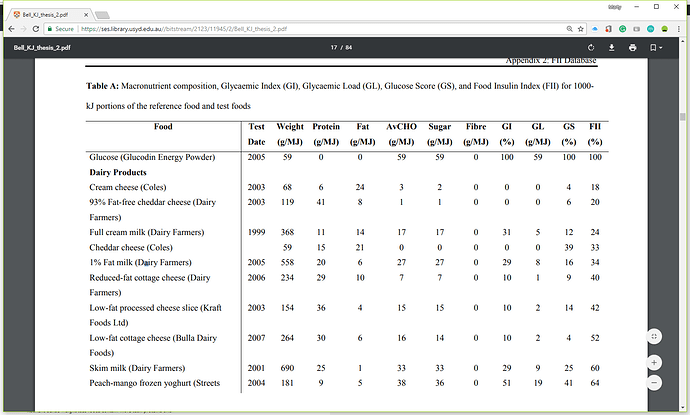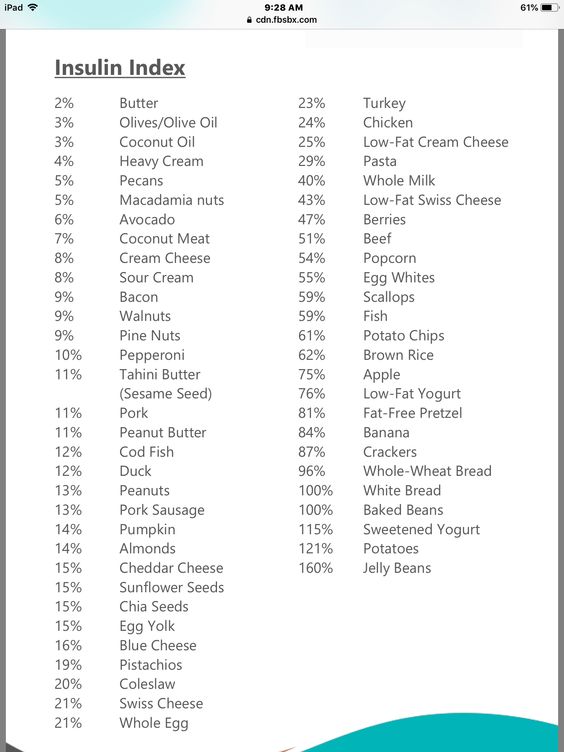is the source for the cheese screeshot
Insulin index chart
I’m not actually sure that’s true in light of Jimmy Moore’s 3:1 protein experiment where he felt like crap and got reactive hypoglycemia. I think we have to be honest and say that too high of a protein intake can have negative effects. It might not necessarily be the fear that people have, being “kicked out of ketosis”, but still considerations to be had. And in Jimmy’s case it was frankly an absurd protocol (not blaming Jimmy, the protocol itself is not a natural eating pattern).
I found it interesting that his fasting insulin dropped from 14 to 8.8 after five days and then bounced back up to 18 after two days of high fat re-feeding before the final labs were done. This post was inspired by some discussions Jimmy and I had during the experiment.
I’m not advocating an abrupt change from high fat keto to 3:1 protein:fat for only 7 days, but I think focusing on nutrients over ketones without avoiding protein for fear of it raising his glucose (which it didn’t) would be a good “biohack” for the future.
Seems this one was set up to fail. 
@nearing I can’t see those results in the data tables in the appendix from the testing?!?!
At the end of the thesis, can’t remember which pdf, she has a booklet for consumers - it’s there.
I screenshotted it.
The problem with the insulin index is that the mix of food types in a meal will likely change the insulin index result, just like it does with the glycemic index.
With the glycemic index, a higher fat content lowers the overall glucose load (ie butter all over the bagel is going to spike glucose less than low fat spread). I think it’s fair to assume that insulin response might behave similarly.
We really need research on the insulin index of meals rather than single foods because in reality this is what our bodies are dealing with. My guess would be that the fat content in a meal will reduce the insulinogenic affect of protein greatly for instance (ie a whole egg will be less insulinogenic than the eggwhite on its own).
How did it fail? The goal of the experiment was to test Ted Naiman’s assertion that “too much protein is not a thing”. They consulted with Ted on a protocol that Ted himself has referenced, and Ted has said that he has no problem with the way Jimmy and John conducted the experiment. Well, they tried the experiment and had some pretty sub-par and sometimes downright bad results. Does this then prove that too much protein indeed can be bad? Which again, was the goal of the experiment, not nutrient density. In my mind this shows, for at least N=2, that a lot of protein at the expense of fat is not all roses.
btw I realize this side discussion isn’t really relevant to the thread.
I think there is a lot of interpretation involved in carrying forward the old article that Ted referenced in relation to a 3:1 ratio. The interpretation that I find most feasible is that the article was suggesting 3 parts lean meat to 1part fat, which is a lot different than 3g protein:1g fat, which is another interpretation of some of Teds infographics.
I do recall reading the Ted did question whether Jimmy was tall enough to justify 275 lbs as his ideal body weight. Jimmy is tall, but…
Ted usually recommends 1g protein for each lb of ideal body weight, and adjust fat based on current body composition and goals.
I believe Jimmy set his protein target at 275g, and most of what I saw posted looked like lean deli meat.
That’s fine and reasonable, and I agree. But Ted has also been very fast and loose with his proclamations of “too much protein is not even a thing” (literal quote). If nothing else this experiment tested that theory, and I’d say there definitely is such a thing as “too much” protein, at least from a standpoint of not feeling like crap. Ted needs to dial down his protein infatuation to Ben Bikman levels of reasonableness, that’s where I feel the sweet spot is.
At the end of the thesis, can’t remember which pdf, she has a booklet for consumers - it’s there. I screenshotted it.
@nearing I went back and had a look at the thesis (it’s been three years since I read it). The picture that you showed above is their food insulin demand (FID) which is different to insulin load of % insulinogenic calories. I don’t follow exactly how they arrived at those numbers.
We really need research on the insulin index of meals rather than single foods because in reality this is what our bodies are dealing with.
The good news is that the insulin index data allows us to understand the insulin response to mixed foods (i.e. insulin load = carbs - fibre + 0.56 * protein - 0.75 * fructose). This is handy if you want to stabilise blood sugars or need to calculate your insulin dosing.
I don’t think it failed. I would call a reduction in fasting insulin after five days and blood glucose a success. I’m also assuming weight loss would have been substantial without as much muscle loss as fasting.
It’s comments like this from the Keto Savage podcast that make me think that it was set up to fail.
“It’s hysterical to me that there’s a group that calls themselves keto but they push a high protein diet…. I’m actually going to test it soon by the way. I’m gonna test it soon by the way. I’m gonna eat all meat diet because of this carnivore nonsense is out there. I’m gonna test having a 3:1 ratio of protein to fat. I’m gonna be starving Robert, but I’m gonna test it. I want to prove a point. But you have to moderate protein because of the glucose effects that happen. If you’re very sensitive to the effects of carbohydrates because of the glucose effects then guess what? You’re also going to be sensitive to excessive protein for the same reason, so that’s why you moderate it down… Is it a high-fat diet? Absolutely! Fat to satiety. That’s where it’s at. I tell people that’s the fun part of keto. You get to have all that beautiful real food based fats. Fat actually becomes your fuel.”
“And we’re so going to be testing this. John Lamanski, my KetoHackingMD cohost, I called him up the other day, and I said, ‘Dude. This carnivore thing is ticking me off! We got to do this experiment, to at last show what happens, to us, and especially for me, as someone who has the insulin resistance. This is going to be a metabolic disaster for me. I already know it! Will I maybe lose some weight? Maybe. How do you call it a ketogenic diet if you have no ketones? And then blood sugar will obviously have to go up.”
http://ketosavage.com/jimmy-moore-on-the-keto-diet.../
Ted warned that it was going to be hard work.
If I was aiming for success I would slowly transitioned Jimmy into an adequate protein approach dialling down the fat to ensure an energy deficit to the point that he was losing weight over the long term. 3:1 is the extreme end of the PSMF which has been used successfully in weight loss clinics and by body builders for decades. But with a significant deficit below normal intake hunger is real. It’s also probably going to take some time for Jimmy to get used to digesting that much protein. And I’m not sure whether launching into it shortly after a couple days after a week long fast was ideal either.
Isn’t this highly individual?
Yes, but I think we have a pretty good understanding of what we can do to move the needle in the direction we want. I think where some people come unstuck is thinking that they are insulin resistant when they are actually fairly insulin sensitive. This post was inspired by this protein hack.
WRT: protein, it’s highly context specific. Ben Bikman at LC Breckenridge 2018 makes the case with work from his lab.
WRT: Insulin resistance v sensisitivy: A lot of lay people don’t understand the science, and so resistance is how they view it. They do get that they need to improve their insulin sensitivity, so they get it right in the long run, even if they don’t understand the mechanisms of the before state.
That said, I’m resistant. At 265ish, I can gain no weight. That’s the limit of my fat cells.
Last thing: Bikman in an interview said that he uses his KetoMojo to check insulin. If ketones rate .1 or higher, insulin must be low, absent exogenous ketones.
Found this insulin index chart from Dr. Berg’s youtube about slow metabolism. https://www.youtube.com/watch?v=dt1DOJXAXFg
Just developed this keto calculator using the insulin index. You guys may be interested.
Details of how it works here:
Doctor bird has a video on YouTube called how to fix a slow metabolism: must watch. . Does an excellent job on explaining how insulin works and how insulin determines whether or not you will lose fat. 24 minutes long


